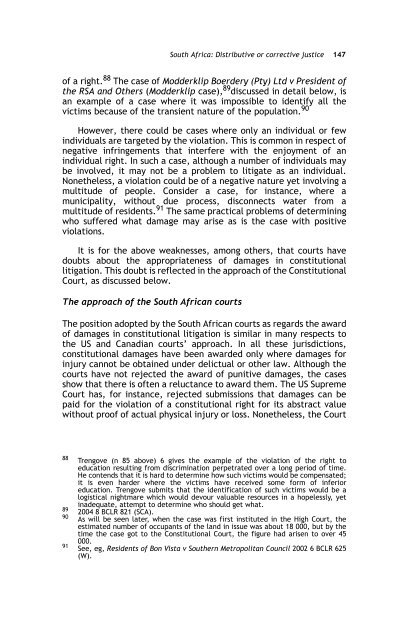LITIGATING SOCIO-ECONOMIC RIGHTS IN SOUTH AFRICA - PULP
LITIGATING SOCIO-ECONOMIC RIGHTS IN SOUTH AFRICA - PULP
LITIGATING SOCIO-ECONOMIC RIGHTS IN SOUTH AFRICA - PULP
Create successful ePaper yourself
Turn your PDF publications into a flip-book with our unique Google optimized e-Paper software.
South Africa: Distributive or corrective justice 147<br />
of a right. 88 The case of Modderklip Boerdery (Pty) Ltd v President of<br />
the RSA and Others (Modderklip case), 89 discussed in detail below, is<br />
an example of a case where it was impossible to identify all the<br />
victims because of the transient nature of the population. 90<br />
However, there could be cases where only an individual or few<br />
individuals are targeted by the violation. This is common in respect of<br />
negative infringements that interfere with the enjoyment of an<br />
individual right. In such a case, although a number of individuals may<br />
be involved, it may not be a problem to litigate as an individual.<br />
Nonetheless, a violation could be of a negative nature yet involving a<br />
multitude of people. Consider a case, for instance, where a<br />
municipality, without due process, disconnects water from a<br />
multitude of residents. 91 The same practical problems of determining<br />
who suffered what damage may arise as is the case with positive<br />
violations.<br />
It is for the above weaknesses, among others, that courts have<br />
doubts about the appropriateness of damages in constitutional<br />
litigation. This doubt is reflected in the approach of the Constitutional<br />
Court, as discussed below.<br />
The approach of the South African courts<br />
The position adopted by the South African courts as regards the award<br />
of damages in constitutional litigation is similar in many respects to<br />
the US and Canadian courts’ approach. In all these jurisdictions,<br />
constitutional damages have been awarded only where damages for<br />
injury cannot be obtained under delictual or other law. Although the<br />
courts have not rejected the award of punitive damages, the cases<br />
show that there is often a reluctance to award them. The US Supreme<br />
Court has, for instance, rejected submissions that damages can be<br />
paid for the violation of a constitutional right for its abstract value<br />
without proof of actual physical injury or loss. Nonetheless, the Court<br />
88<br />
Trengove (n 85 above) 6 gives the example of the violation of the right to<br />
education resulting from discrimination perpetrated over a long period of time.<br />
He contends that it is hard to determine how such victims would be compensated;<br />
it is even harder where the victims have received some form of inferior<br />
education. Trengove submits that the identification of such victims would be a<br />
logistical nightmare which would devour valuable resources in a hopelessly, yet<br />
inadequate, attempt to determine who should get what.<br />
89 2004 8 BCLR 821 (SCA).<br />
90 As will be seen later, when the case was first instituted in the High Court, the<br />
estimated number of occupants of the land in issue was about 18 000, but by the<br />
time the case got to the Constitutional Court, the figure had arisen to over 45<br />
000.<br />
91<br />
See, eg, Residents of Bon Vista v Southern Metropolitan Council 2002 6 BCLR 625<br />
(W).
















